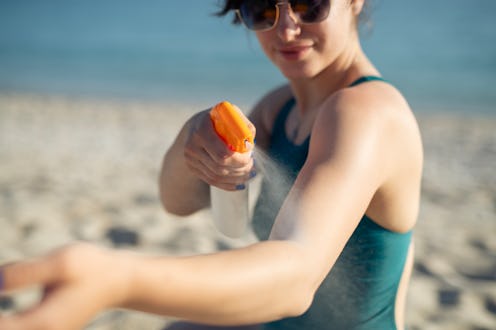
When you think of sunscreen, you probably imagine sunny days by the pool, sea breezes, and the taste of your favorite cocktail. Chances are, for many people sunscreen has pleasant summer vacation memories attached to it, so you might not think about the most shocking facts about sunscreen.
Now I'm not by any means trying to dissuade you from using sunscreen — especially considering all of the health risks of sun exposure — nor am I trying to rain all over your glorious vacation memories. Sunscreen in itself is awesome and not usually gross, however if it's used incorrectly, things can turn a little icky. It's kind of like anything in life; if you don't abide by the instructions, you're not going to get the most out of the product. But when it comes to sun protection, there's no wiggle room for second guessing or making up your own rules.
My guess is your relationship with sunscreen goes back a very long way. There's something so nostalgic about the scent of sunscreen (it doesn't matter which brand it is, they all smell the same, IMO) that brings back memories of picnics at the park, roaming the streets with your BFFs in the school holidays, and your first time abroad. It would be a shame to ruin your relationship with sunscreen now.
I spoke with some skincare experts to discover the most gross facts about sunscreen, so you can avoid any nasty surprises in the future.
1. Sunscreen Expires Like Food
"Just think of expired sunscreen the same way you would think of expired food," says Eileen Bischoff esthetician at Eve Salon, in an email to Bustle. "You wouldn't eat it because you don't want to put anything inside your body that could cause it sickness or harm."
Along with that delightful image, board-certified dermatologist Dr. Janet Prystowsky, says, "Using expired sunscreen may not work well! However, I have never seen an adverse reaction from using 'old' sunscreen."
2. Sunscreen Is Absorbed Into Your Bloodstream
"Did you know that 60 percent of what you apply topically to your skin is absorbed into your bloodstream? Therefore, you would not want to use any expired skin products, especially expired SPF, because you are using it to try and protect your skin from harmful UV rays and it would not be fully effective," explains Bischoff.
In addition to this, Dr. Prystowksy says, "If you use chemical sunscreens, as opposed to mineral based sunscreens with zinc oxide or titanium dioxide, the sunscreen chemicals may be found in your bloodstream for days after use. The long term effects are not well understood."
If you really want to steer clear of expired sunscreens and chemical sunscreens if possible.
3. Sharing Sunscreen Sticks Could Lead To Infections Spreading
Do you and your partner or bestie always share sunscreen sticks when you're on vacay? You might want to re-think that move. According to Dr. Prystowksy, "If you share sunscreen sticks that are rubbed on, you run the risk of transferring bacterial infections like impetigo." Thankfully, she adds, "Sprays and lotions that are shared are unlikely to cause a problem."
Don't let these shocking facts put you off using sunscreen — just make sure your sunscreen is in date, is mineral based, and isn't in stick form if you're sharing. Long may your love affair with sunscreen reign.
Images: Getty Images (4)